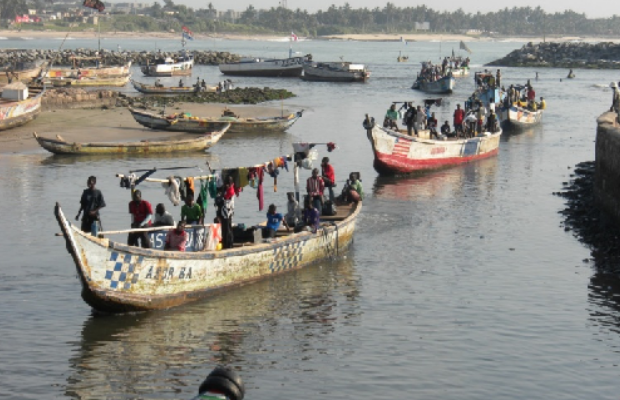No canoe will be allowed into Ghana for the next 3 years – Fisheries Minister
- Posted on
- Comment

The Minister for Fisheries and Aquaculture Development, Mavis Hawa Koomson, has announced measures to tackle the impact of illegal fishing on the economy.
The measures include the announcement of a Moratorium on new Artisanal Canoe Entrants which takes effect from 1st October 2023 to 30th September 2026.
“This means that no canoes will be constructed and brought into the system for the next three years. With this measure, is expected that the pressure on our fisheries resources, in addition to the other measures the government is implementing will all contribute to a reduction of the pressure on our fisheries resources, in order to recover the over exploited small pelagic stock,” she said in a statement announcing the moratorium on Thursday, September 14 at a press conference in Accra.
Madam Hawa Koomson further explained that the fisheries sector contributes significantly to nutrition and food security, as well as to employment opportunities and poverty reduction and in Ghana.
In Ghana, she added, the fisheries sector is made up of the artisan, semi-industrial and industrial fisheries. The marine artisanal fisheries subsector contributes to about 70% – 80% of the total annual pelagic catch.
This subsector is sustained by small-scale fishers and fish processors. This Traditional manner of fisheries in Ghana, involves fishers, using relatively small amount of capital and energy, relatively small fishing vessels (canoes), making short fishing trips, close to shore, mainly for local consumption, she said.
“Notwithstanding the subsector’s significance, our artisanal fishermen have engaged in activities which had contributed to overcapacity, overfishing, low productivity and low profitability in the marine fisheries sector. In the midst of our fishers struggling to make their expeditions more profitable, the small pelagic stocks are on the verge of collapse.
“With the current open access regime, the canoe fleet has increased from 8,000 in 1990 to over 12,000 in 2023. However, the small pelagic fish landings, which is the backbone of the artisanal subsector, has decreased from 119,000 metric tons in 1990 to 20,000 metric tons 2022. For instance, annual landings of the Sardinella Aurita declined from 119,515 tonnes in 1992 to 11,834 tonnes in 2019 representing 9.9% of its largest recorded landings. Indeed, our scientist have informed us that a stock is considered collapsed when it reaches 10% of its highest yields and have therefore concluded that the Sardinella Aurita has collapsed. The decline in landings of the small pelagic fishes is affecting the livelihoods of over 3 million people along the value chain.
“This situation has compelled most fishers to engage in various forms of Illegal Unreported and Unregulated fishing activities, such as the use of undersized mesh nets leading to landing of juveniles, light fishing, the use of chemicals and explosives to make their fishing expedition profitable.
“You will agree with me that we no longer experience bumper catches like we used to in the 1970’s and 90’s when our women bring the fish to the communities shouting ‘eeigmon oo’ ‘eeigmon oo’
“Could you imagine our staple meals without, ‘abobi’, ‘eban’ and ‘saman’. Not only are these fishes relatively cheaper and affordable but they are also highly nutritious, and the collapse of these valuable fishes will have socio-economic impact in our beloved country.
“This situation is worrying, and the Government is pursuing a number of measures to reverse the declining stock level to avert the collapse of the fishery,” she said.
-3news










 (Selorm) |
(Selorm) |  (Nana Kwesi)
(Nana Kwesi)